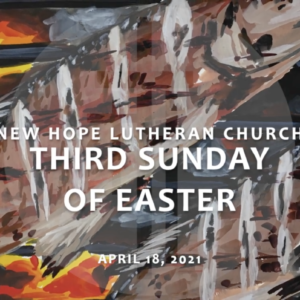Luke 24:36b-48
36b Jesus himself stood among the disciples and said to them, “Peace be with you.” 37 They were startled and terrified, and thought that they were seeing a ghost. 38 And Jesus said to them, “Why are you frightened, and why do doubts arise in your hearts? 39 Look at my hands and my feet; see that it is I myself. Touch me and see; for a ghost does not have flesh and bones as you see that I have.” 40 And when Jesus had said this, he showed them his hands and his feet. 41 While in their joy they were unbelieving and still wondering, he said to them, ‘Have you anything here to eat?’ 42 They gave him a piece of broiled fish, 43 and he took it and ate in their presence.
44 Then Jesus said to them, “These are my words that I spoke to you while I was still with you—that everything written about me in the law of Moses, the prophets, and the psalms must be fulfilled.” 45 Then Jesus opened their minds to understand the scriptures, 46 and said to them, “Thus it is written, that the Messiah is to suffer and to rise from the dead on the third day, 47 and that repentance and forgiveness of sin is to be proclaimed in his name to all nations, beginning from Jerusalem. 48 You are witnesses of these things.”
—————
Please pray with me this morning, church:
Healing God,
Amidst all the stories of hurt and pain,
Death, despair, and hopelessness
We hear all around,
You step into our midst and speak a word of peace.
Give us courage to speak that peace, too.
Give us words to say and hope to share.
Help us witness to your new life and your resurrection
In our lives, and in our world.
Amen.
—————
I preached my first sermon when I was 13 years old.
I know, I know…overachiever.
But it went like this: I was in 8th grade, it was the summer, and I was at summer camp with my Confirmation class. It was our group’s day to lead worship and as we were planning it out the day before they asked if any of the campers wanted to give the message. I was not particularly interested in speaking in front of the entire camp, but our counselors pushed us a bit, “You know, usually it’s the counselors who give the messages at worship, but we think it’d be really cool if one of y’all campers were to give the message. Who’s up for it?” There was a lot of looking around, a lot of avoiding eye contact and suggestive eyebrow raises…stupidly, I mistakenly caught one of our counselor’s eyes…“Chris…how ‘bout it…?”
“I mean…I have zero idea what I’m doing…”
“Yeah, but, you enjoy this stuff, right? You’re good at it…”
“I don’t know…but I guess… What the heck, I’ll give it a shot…”
I’ve preached before about how I’m one of the weird ones who enjoyed Confirmation, right? Like, it was very interesting to me, I found a passion for a lot of the things that had been running around in my head, and I really enjoyed learning a whole bunch of new stuff that I didn’t know before. I’m still not sure if I would say I was “good” at Confirmation, but I was certainly passionate about it. So this was an interesting opportunity.
But I still had no idea how to preach. I still had no clue how to give a message.
I was talking about it after our planning session with my counselor. “I mean, what do I even say? How do you even give a message?”
“Well, where do you see God?” he asked me.
“I don’t know…everywhere, I guess…”
“Ok…good start…but like, where specifically have you been encouraged by God? Where have you struggled, and what’s helped you to see God through that? What’s something that has brought you comfort? What’s something that has helped guide you during tough times, and how might that something be God at work?”
So I told him about earlier that day, how we were at the archery range for our rotation, and I was getting frustrated because I just couldn’t seem to get the arrow on target, and that was even more frustrating for me because I’m a Boy Scout and like, I’m supposed to be good at things like that. And then I told my counselor how in the middle of all of this he had us all sit down and we talked about focus, and where do we focus in our lives, and do we keep ourselves focused on God and what God is asking of us, or are we focused elsewhere, on any number of things that demand our attention. And I told him how his talk with us was super helpful for me because when it got to be my turn again, I was able to find the target more easily with focus. And how maybe that felt like God a little bit…
“Well, sounds like you’ve got a sermon,” he said. “Why don’t you preach on that?”
And so I did.
And it went great.
And I was really proud of myself.
And that was my first sermon.
All sermons are, are just us preachers, standing up here, waving our arms, talking about where we think we’ve seen God show up in our lives, in the lives of you, our parishioners, and in the life of the world.
That’s it.
Where have you seen God? How has God shown up?
Which is also the overarching theme of all of our Easter season readings. How does Jesus continue to show up after the resurrection?
Whether in a bodily presence to the disciples in our Gospel readings, to how do the first Christ-believing communities reflect what they learned from Jesus long after the Ascension, all of our post-resurrection readings point to where God shows up. And asks the question of us—we, who call ourselves followers of this Christ—how does the world see a different view of the resurrected Jesus through us…through our words, through our actions, through the ways we treat others.
How does Jesus show up?
Behind locked doors. In the midst of frightened followers. In community. Eating. Healing. Speaking words of peace.
All things I think we can pretty easily identify with these days, right?
Our Gospel lesson from Luke picks up right after a familiar post-resurrection story of 2 disciples on the road to Emmaus, where Jesus walks alongside them, opens the scriptures to them, and they don’t recognize him at first, but Jesus is finally made known to them in the breaking of the bread. Then this morning, Jesus comes and stands behind locked doors again, speaks a word of peace, and eats fish with the disciples. Jesus, again, is made known in a meal. And Jesus goes on to explain the scriptures to these disciples and ends with a kind of urging, or encouragement, and says, “You are witnesses of these things.”
It’s this witnessing and testifying—this command to evangelism—that you’ll hear in each of the 4 gospels as some of Jesus’ last words to the disciples. So for Jesus, the most important thing for the disciples to do after the resurrection and after Jesus is ascended to God, the most important thing for them to do…is to witness…is to testify…is to tell the story.
To tell the story of their encounter with Jesus.
To testify to where and how they experienced Jesus.
What will you say about these times we’re living through, church? What will your witness be?
Will you tell a story of having to shut your doors, of being driven apart though invited to worship online? Or will you tell a different narrative of innovation and adaptation, of a church learning how to bring the Gospel message even over the airwaves, of being invited to share in a sacred meal together virtually, having no idea how or why Jesus continues to show up in that meal, yet continuing to trust that Christ is still present?
Will you tell a story of being forced to keep distance, sanitizing everything and wearing gloves to prevent exposure? Or will you tell a different narrative of a church that continued to show up for those in need, donating time and money and energy to feeding the hungry, housing the homeless, mentoring elementary students, and caring for the caretakers?
Will you tell a story of scrolling through your newsfeeds and watching catastrophe after disaster repeat in worn-out patterns on your TV screen? Or will you tell a different narrative of a people who refused to stay silent when people have their lives taken from them by those who took an oath to serve and protect them? Will you tell a narrative of a church that continues to affirm the belovedness and sacredness of God’s children, regardless of their skin color…a church that cries out for justice, that weeps with those who are weeping, struggles with those who are struggling, and fights with those who are fighting for God’s vision to finally be made manifest and real in this place?
The story is yours to tell, church.
People—your neighbors…our neighbors—are starving for good news… How will you feed them?
Your testimony can make real, tangible differences in and for our community. Your words have the power to heal…like Peter and John.
You witness can bring things that seem dead from hopelessness and despair back to life.
Your words have that power.
What sermon will you preach, church?
What witness will you give?
What story of new life and restoration—what story of resurrection—is jumping out of you?
Sounds like you’ve got your sermon to preach right there…

